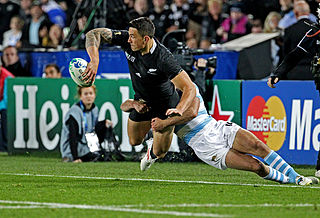Second five-eighths

Second five-eighths, or sometimes second five-eighth,[1] is a name used in New Zealand to refer the rugby union position commonly known elsewhere as the inside centre or number 12.[2][3][4]
It traditionally described a playmaking type of 12 with good passing and kicking skills as opposed to the strong hard runner and tackler in that position providing less game-management and attacking options. Some second five-eighths such as Sonny Bill Williams and Ma’a Nonu, however, combine aspects of both styles of play.[2][5]
Etymology
The 1903 All Black captain, Jimmy Duncan, is credited with coining the name five-eighths when he decided to take a player from the forwards to add to the backs. The backs at that time consisted of two half-backs, three three-quarters, and a full-back. As the additional player stood between half-back and three-quarters, Duncan came up with the term five-eighths according to the fraction between them.[2]
The player at five-eighths, also known as the five-eighth,[1] could take the ball back to the forwards or pass it on to the three-quarters.[2] This backline innovation occurred before the split between rugby union and rugby league in Australia and New Zealand and the term is now commonly used for the five-eighth position in rugby league football.[6]
As the game of rugby union evolved, the two half-back positions acquired separate functions. The outside half-back, now known as the outhalf or fly-half, became the first five-eighths in New Zealand under the two five-eighths system. The next player on his outside was called the second five-eighths.[2]
The terms first-five and second-five are sometimes used as abbreviated versions of first five-eighths and second five-eighths, respectively.[7][8][9]
Notable second five-eighths
New Zealand All Blacks:
Australian Wallabies:
See also
References
- ^ a b The Chambers Dictionary. Allied Publishers. 2006. p. 608. ISBN 978-81-86062-25-8. Archived from the original on 27 December 2014. Retrieved 27 December 2014.
- ^ a b c d e Zavos, Spiro (4 March 2010). "When is a first five-eighths actually a number 10?". The Roar. Archived from the original on 21 September 2013. Retrieved 27 December 2012.
- ^ Rattue, Chris (1 November 2008). "Rugby: Donald measures up Carter's crown". New Zealand Herald. Archived from the original on 10 June 2016. Retrieved 27 December 2012.
- ^ Mortimer, James (6 May 2012). "All Blacks selection analysis - Second five-eighth". All Blacks. Archived from the original on 27 December 2014. Retrieved 27 December 2014.
- ^ O'Leary, Conor (3 November 2012). "What The Hell Is a Second Five-Eighth?". Balls. Archived from the original on 27 December 2014. Retrieved 27 December 2014.
- ^ Australian Language & Culture. Australia: Lonely Planet. 2007. p. 83. ISBN 978-1-74059-099-0.
- ^ "First-five options secure with Crusaders". One News. Fairfax. 29 June 2013. Archived from the original on 5 October 2013. Retrieved 27 December 2014.
- ^ Chadwick, Justin (2 September 2014). "Rugby: Under-fire Beale still right first-five fit for us - Slipper". New Zealand Herald. Archived from the original on 28 December 2014. Retrieved 27 December 2014.
- ^ Bradford, Brendan (16 October 2014). "Cruden "definitely not getting punished" says Hansen". Sportal. Archived from the original on 28 December 2014. Retrieved 27 December 2014.
Sources
- Quinn, Keith (1993). The Encyclopedia of World Rugby. ABC Books. ISBN 978-0-7333-0146-9.
